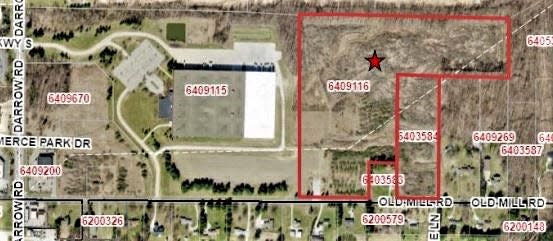Supreme Court asked to again decide ‘Project Gumbo’ ballot fate

TWINSBURG – Old Mill Road resident Lynn Clark is seeking yet another writ of mandamus from the Ohio Supreme Court, this time in an attempt to get the “Project Gumbo” industrial development issue on the November 2023 ballot.
On Sept. 20, Clark, through his attorney Warner Mendenhall, filed a verified petition for a writ, which this time names the Summit County Board of Elections as the respondent.
On Sept. 21, the Supreme Court ordered the BOE to file an answer to the complaint no later than Sept. 23, with no extension of time permitted.
In early September, the Supreme Court granted Clark’s first writ ordering the city to submit petitions collected by a committee of four residents to the elections board to get a referendum regarding City Council’s site plan approval on the Nov. 8 ballot.
Project Gumbo is what residents and city officials are calling Scannell Properties’ plans to build two large warehouses on 33 acres of industrially-zoned land east of Darrow Road and north of Old Mill Road.
Residents living along Old Mill Road — and some from other parts of town — have opposed the project, citing concerns about noise, heavy truck traffic, possible effects on water supplies and possible reduction in property values.
Clark’s first writ request came after the city did not send the signatures to the board of elections because it claimed Council’s action was administrative and not legislative, and not subject to referendum.
The board of elections confirmed that enough signatures were obtained on the petitions to allow the referendum to go on the ballot, but after a hearing earlier this month, sided with the city that Council’s action was administrative and not subject to a decision by voters.
“From the outset the city’s legal position has been simple: the Project Gumbo site plan approval was not an action subject to referendum vote of the people,” said Twinsburg law director Matt Vazzana. “Not surprisingly, the board of elections agreed with that position, and the city is confident the Ohio Supreme Court will uphold the [boars's] decision.
“While it is never pleasant to defend a lawsuit filed by a city’s own resident, the city chose to defend the rights of all of its community members to use property in a lawful way without fear their neighbors would file misguided referendum petitions against them.”
As for the status of Project Gumbo, Vazzana said the plans are moving forward, and “Clark’s latest filing against the board of elections does not stop it.”
At the elections board hearing, the city’s outside attorney Irving Sugerman and Vazzana argued that Council’s action was not legislative since it did not enact a law, and Council has the authority under codified ordinance to OK a site plan that differs from the planning commission’s recommendation.
Mendenhall argued since Council modified the site plan, its action was legislative and did not follow procedures outlined in a zoning code section.
Clark’s latest filing claims Council had two options to act on the planning panel’s recommendation – either approve the original site plan by a simple majority or deny it via a super majority (at least five votes against).
The filing claims Council chose neither option, but instead used its legislative power to create a third option not provided for in Section 1181.09 of the city’s codified ordinances – to condition or modify approval of the site plan by a supermajority.
“Council’s resolution effectively amended Section 1181.09 by giving it administrative authority it did not have,” Clark’s latest request for a writ states.
As per a past case ruled on by the Ohio Supreme Court, Clark’s filing claims an administrative act must involve a law in existence, but Council’s action created a new law, thus making it a legislative act subject to referendum.
In addition, Clark’s filing claims the city’s charter gives residents “the power to approve or reject at the polls any ordinance of other measure enacted by Council by referendum petition submitted to the clerk of Council in accordance with the provisions of the Constitution or laws of Ohio now or hereafter in effect.
“Thus, Twinsburg’s charter reserves to its electors the power to approve or reject via referendum any Council action whether legislative or administrative.”
The filing says that given the proximity of the Nov. 8 election, Clark requests the issue appear on the Nov. 7, 2023 ballot, and that “he be awarded costs and attorney fees and such other relief at law or in equity as the court may deem necessary.”
As for an administrative appeal regarding Project Gumbo, which Clark filed in July in Summit County Common Pleas Court, the city has requested an extension of time to file its administrative record.
The request means the city will have until Sept. 30 to file its record. The reason cited by Sugerman and his colleague Matthew Vansuch for the extension is that they were not involved in the proceedings that lead to the appeal and were later retained to represent the city.
“The purpose is not to delay these proceedings, but to allow the [two attorneys] sufficient time to work with the city to properly prepare the record,” wrote the attorneys from the Brouse McDowell law firm in their motion.
The administrative appeal has been assigned to Judge Susan Baker Ross.
Contact the newspaper at twinsburgbulletin@recordpubcom.
This article originally appeared on Akron Beacon Journal: Supreme Court asked to decide ‘Project Gumbo’ ballot fate
